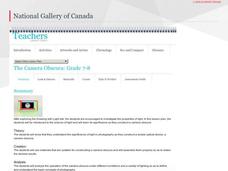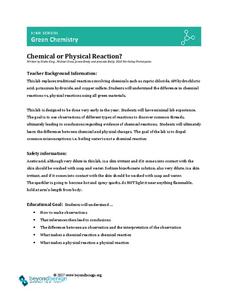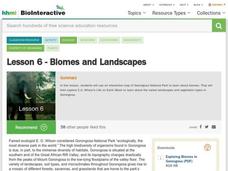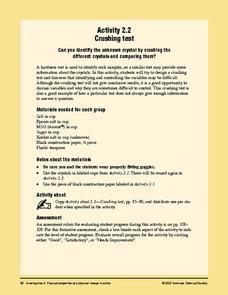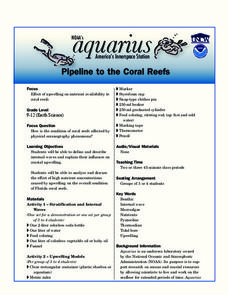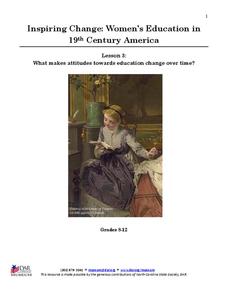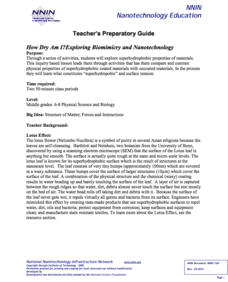National Gallery of Canada
The Camera Obscura
You can create a camera with even the most unassuming materials. Learners view photographs and talk about the art. Some background information is included about the camera obscura for you to present before individuals make their own...
Towson University
Looking Backwards, Looking Forward
How do scientists know what Earth's climate was like millions of years ago? Young environmental scholars discover how researchers used proxy data to determine the conditions present before written record. Grouped pupils gain experience...
Beyond Benign
Chemical or Physical Reaction?
Ready to take your chemistry class on its first big lab adventure? Dive in to differentiation between chemical and physical changes with a thoughtfully designed set of experiments! Partners conduct a series of reactions, describe their...
DiscoverE
Build a Cable-Stayed Bridge
Large or small, bridges are architectural wonders! Construct a large-scale cable-stayed bridge during a whole class project. Scholars work in groups to erect the towers, build the roadway, and secure the cables of their very own bridges....
K20 LEARN
Shanking A Shark: Shark Dissection
Sharks are so cool, they have their own week! Take young zoologists on a journey into one of the most amazing creatures on the planet. A lesson plan the from K20 Center engages them in a full dissection. After the lab, participants...
Howard Hughes Medical Institute
Lesson 6: Biomes and Landscapes
Aside from the amazing animals in Gorongosa National Park, what else is there to discover? The sixth installment in an eight-part themed series contains an interactive map where scholars can learn more about the geographic features of...
Howard Hughes Medical Institute
Sorting Finch Species
Don't just tell your class about Darwin's finches ... show them! Sort some of science's most famous birds using an interactive lesson. Learners try their hand at classifying finches using song, sonogram, and beak appearance, as well as...
PBS
The Planets of the Solar System
Launch a lesson that's sure to capture middle schoolers' interest! Exploration enthusiasts examine the planets of our solar system using an activity from PBS's Space series. The resource includes images and information for each planet,...
Curated OER
Fossil Find
Students investigate the practice of digging for fossils. They participate in a mock dig of fossils using real bones and other artifacts. Then students dig through sand in order to go through the simulation. Students make observations...
Curated OER
Classification of Matter
This is a great worksheet with an infographic to assist your students in categorizing matter into mixtures and non-mixtures. Information is given about the metric system of measurement. Your young students match 13 terms with their...
Curated OER
Lesson: Cultural Comparisons
A game, research, and cross-cultural comparisons are in the works as you open an artistic lesson. Upper graders get analytical as they make observations that will help them create a link between abstract and creative thinking. They...
Curated OER
Dante's Peak Movie Review
Middle or high school volcanologists watch the 1997 film, Dante's Peak. They make observations as they watch and then write a movie review, focusing on what was accurately represented. They also point out what facts were stretched by...
Curated OER
Setting Details in Of Mice and Men
After completing John Steinbeck’s Of Mice and Men, groups are assigned a chapter to reread. Members list major conflicts and events and quote setting details. They then make observations about how the setting prepares the reader for the...
Illustrative Mathematics
Temperatures in degrees Fahrenheit and Celsius
Learners investigate the relationship between the Fahrenheit and Celsius temperature scales. Given two data points, they construct a linear function to describe the relationship, find the inverse of the function, and make observations...
US Environmental Protection Agency
Weather and Climate: What's the Difference?
Future weather forecasters collect daily temperatures over a period of time. Afterward, they compare their data with monthly averages, as researched on national weather websites, in order to grasp the difference between weather and...
American Chemical Society
Crushing Test
Solidify understanding of the properties of crystals by crushing them to compare hardness. After some class discussion, a procedure is planned, and then small groups go about making observations as they crush five different crystal...
Explore Sound
Sound and Music
What causes sound? Groups of sound detectives use a variety of tools including ping pong balls, pasta noodles, raisins, rubber mallets, and a tuning fork to investigate what causes sound. The young Sherlocks conduct a series of...
University of Minnesota
Balance: The Ears Have It
Don't go around and around with the same concept! A hands-on activity explores the vestibular system and circular motion. After spinning a group member, lab partners examine their eye movement. Making observations allows the group to...
Florida International University
Pipeline to the Coral Reefs
Discover firsthand the effects of internal waves on coral reefs. Through a series of experiments, learners simulate internal waves and upwelling events as they make observations on the movement of water and other debris. They then...
National Society Daughters of the American Revolution
Lesson 3: What Makes Attitudes Towards Education Change over Time?
The struggle for women's rights is not unique to this generation, or even to the 20th century. Class members explore the conflicting opinions of Alexander Graham Bell and his wife, Mabel Hubbard Bell, regarding women's pursuits of higher...
National Nanotechnology Infrastructure Network
How Dry am I? Exploring Biomimicry and Nanotechnology
Help your classes feel like they can walk on water! An engaging inquiry-based lesson has young scholars experiment with different surface coatings. They make observations about their properties and how they relate to the surface tension...
Howard Hughes Medical Institute
The Mosquito Life Cycle Activity
Understanding the life cycle of a mosquito helps us understand how to prevent the spread of diseases they carry. A lab investigation provides learners with the opportunity to track the two-week life cycle of the mosquito. Scholars make...
Science Matters
Series Circuit and Switches
Lights out! Scholars build on their understanding of a simple circuit by adding a switch and creating schematic drawings. The eighth lesson in a series of 14 has pupils use everyday materials to create circuits and make observations as...
Aquarium of the Pacific
Sensational Sharks
Pray that you are not the prey of sharks! The class watches a video and a webcam on sharks and make observations about the different types of sharks. Learners compare two sharks and list their similarities and differences. They then...
Other popular searches
- Making Observations Science
- Making Observations Biology
- Ell Making Observations
- Making Observations in Science
- Ell + Making Observations


